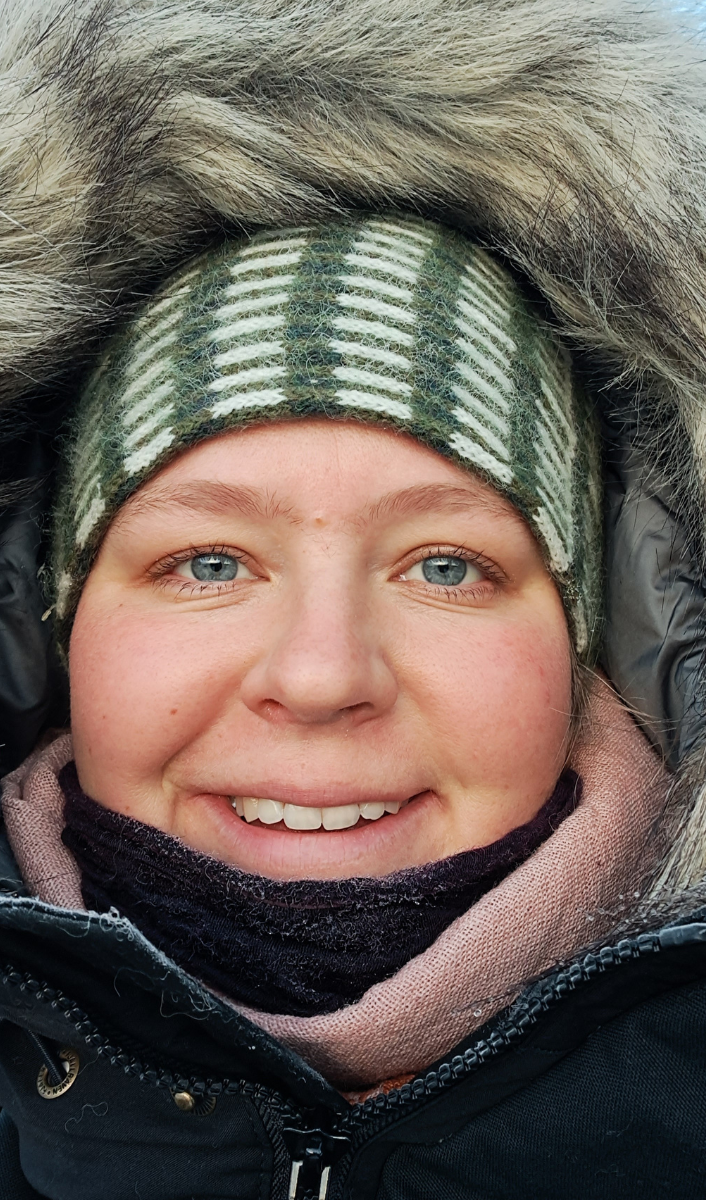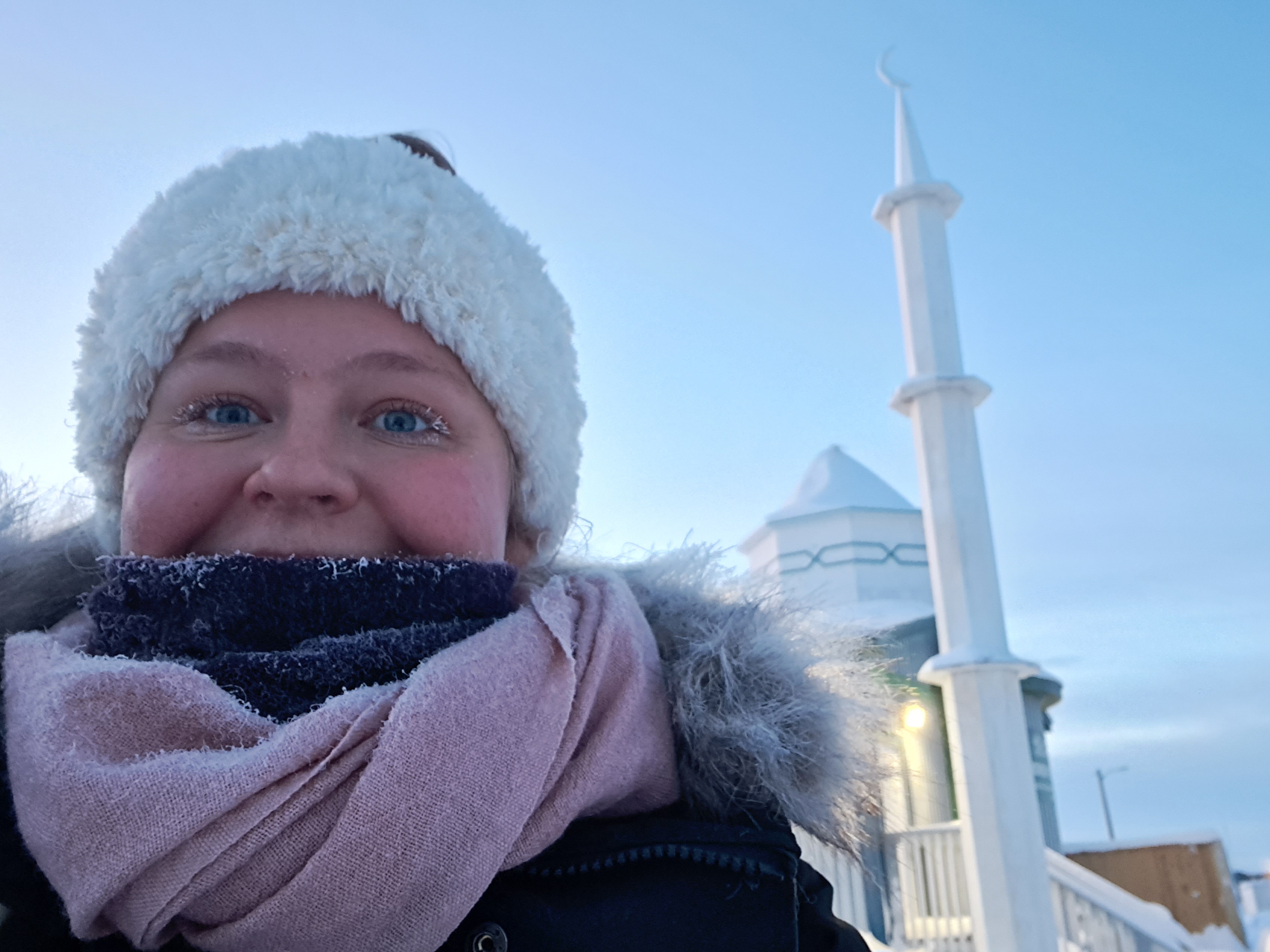Bouchra Mossmann

Visiting Graduate Student
Note: Ms. Mossmann is a PhD candidate in the Dept. of Culture and Language at the University of Southern Denmark (and part of the SDU Arctic research team). Her co-supervisor is Memorial's Dr. Jennifer Selby, Dept.of Religious Studies.
What are you currently working on?
I am currently pursuing my PhD at the University of Southern Denmark in Odense, working on a research project called "The Arctic Muslim." Within this project, my part is the study of Muslim communities’ and individuals’ lived experiences in the Canadian Arctic. Through fieldwork and interviews with community members, I have collected data from Yellowknife, Inuvik, and Whitehorse. These communities have seen the construction of purpose-built mosques in the past 15 years, a development that has fostered a significant Muslim presence, making them ideal focal points for my study.
My research interests are twofold: Firstly, I study faith practice, examining how individuals and mosque communities grapple with the challenges posed by extreme changes in daylight, particularly concerning prayer times and fasting rituals during the month of Ramadan. I aim to understand the nuanced ways in which these challenges are addressed within small yet diverse communities. Secondly, I broaden my scope to explore the larger community context, investigating the impact of policies on Muslim life in the Canadian Arctic. Additionally, I am keen to uncover the dynamics of interactions between Muslim and Indigenous communities within this unique geographical and cultural landscape.
What makes Memorial particularly suited for your work? What drew you to visit MUN, and how have you been able to maintain that connection?
I came to MUN as a visiting graduate student for the past winter term (2024) in order to spend time with my co-supervisor, Dr. Jennifer Selby, who is a professor in Religious Studies and Political Science. Given the encouragement to spend time at universities abroad as part of our program in Denmark, this was a natural choice.
Together with Dr. Selby, we held a symposium under the title “Qualitative Quandaries” to exchange and discuss struggles in qualitative research with other graduate students and guest lecturer, Dr. Sophie Gilliat-Ray, an anthropologist from Wales. In addition to that, my stay at MUN allowed me to discuss my work with Dr. Selby on a regular basis in person. I was also offered the opportunity to present and discuss my work in a weekly workshop together with other graduate students from the social sciences and humanities. This was instrumental in shaping my methodology chapter.
Before arriving at MUN, I had the opportunity to attend Dr. Arn Keeling’s class online the previous year and later gave a talk during my visit. I was also invited to present within the Scholars of the Square format, further enhancing my academic experience at MUN.
(Continues below photo)

Midnight Sun Mosque in Inuvik; submitted by Ms. Mossmann
When and why did you first feel inspired to work in this area?
My interest in studying Muslims in the Canadian Arctic has been sparked by the absence of rural and northern contexts in existing research on Muslims in Canada and my ambition to contribute to filling this gap in the literature. Learning about the Midnight Sun Mosque's journey from Winnipeg to Inuvik, my curiosity about northern Muslim communities grew. When I took Dr. Arn Keeling’s course “Critical Northern Geographies” at Memorial, I was fascinated by the readings that center Indigenous Knowledge and decolonization, and take activist and feminist approaches to the study of the north.
For my research, I see the North as a unique lens through which to understand the diaspora experiences of Muslims. The challenges and community dynamics that surface in this environment offer valuable insights not as readily visible in urban contexts further south.
With my background in Islamic Studies and Arabic, I had lived in Middle Eastern countries for a couple of years and struggled with the hot climate, thus, I have found comfort in colder climates.
Can you share a memory with us of an interesting day of your recent work? (And/or: What does a typical day in your work/research life look like?)
During my fieldwork, my days consist of a mix of interviews, meetings, and casual chats. I also spend time going through newspapers at archives, visiting local museums or libraries, and attending community events. Unlike a typical 9-5 schedule, I often find myself in meetings until after dinner.
While it is hard to pick just one memory, I feel incredibly grateful for the many beautiful and heartfelt encounters I have had with my interview partners. Some of them have become friends, and I appreciate the snippets of their lives they've shared with me. I hope these connections will last. Sometimes, fieldwork means lending a hand at the food bank or getting invited to visit nearby sites.
One standout experience was my first visit to the Arctic Ocean in Tuktoyaktuk, where I had meaningful conversations with two of my interview partners during the journey there and back.
What is something you’d like for people to know about the north (or your more specific focus area)?
This uestion aligns closely with my research objective, which is to dispel misconceptions about both Muslims and the north. I aim to encourage more people to actively engage with it, whether through reading about it or visiting in person. Contrary to common belief, many northern places are not as remote as perceived; for example, Yellowknife is just a 2-hour flight from Edmonton, and the same goes for Whitehorse from Vancouver.
It is important to note that many people in the North do not see themselves as remote just because they have different points of reference and they take pride in their identity as northerners. The region boasts a rich history, and immense cultural, linguistic, social, and economic diversity, both regarding Indigenous People and newcomers.
Community plays a significant role in most people’s lives in the places that I have visited. My observation is that professional, financial, or educational backgrounds matter less compared to what folks contribute to the community and how they treat others. This emphasis on social values is something often missed in urban environments further south.
During my interviews, several participants emphasized the spiritual atmosphere they find in the North, being in close proximity to nature and God’s creation.
I resonate deeply with this sentiment; to many, nature holds a spiritual and sacred significance.
